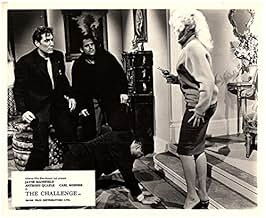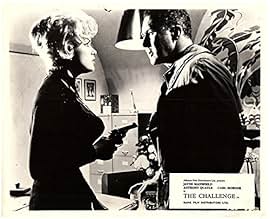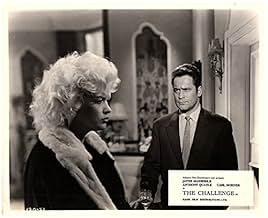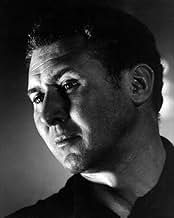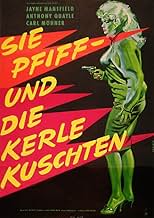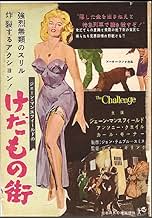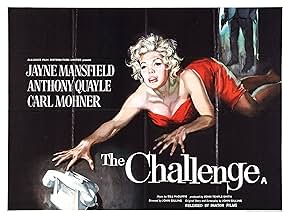A gang leader dumps her criminal boyfriend when he is convicted of robbery, but he recovers the stolen loot once he's released. In retaliation, the gang kidnaps his son and demands the money... Read allA gang leader dumps her criminal boyfriend when he is convicted of robbery, but he recovers the stolen loot once he's released. In retaliation, the gang kidnaps his son and demands the money as ransom.A gang leader dumps her criminal boyfriend when he is convicted of robbery, but he recovers the stolen loot once he's released. In retaliation, the gang kidnaps his son and demands the money as ransom.
Storyline
Did you know
- TriviaBritish singer Joan Small provided Jayne Mansfield's singing voice.
- GoofsIt is never explained why the lorry drivers decide to attack Jim and tie him up rather than help him to retrieve the loot.
- ConnectionsFeatured in Neil Sean Meets...: Stars & Friends of Jayne Mansfield (2015)
- SoundtracksThe Challenge
Lyrics by Robert Halfin
Music by Bill McGuffie (as William McGuffie)
Performed by Jayne Mansfield (dubbed by Joan Small) (uncredited)
Featured review
It is sometimes said that the age of film noir was over by the end of the fifties; Orson Welles's "Touch of Evil" from 1958 is sometimes regarded as marking the end of the line. This may be true of America, the genre's original home, but in Britain noir survived into the sixties. This may be because we were slower than America to adopt colour television, meaning that there was still a market for black-and-white films here. "The Challenge" from 1960 is an example of later British noir. (In America it was shown as "It Takes a Thief", but I will use the original British title).
Jim Maxton, a lorry driver and petty criminal, is persuaded by his gang leader lover Billy to take part in a big robbery. (And no, this isn't a rare example of a film from the early sixties with a gay theme. Although the cast-list spells her name as "Billy" rather than "Billie", she is a woman). He is betrayed to the police, arrested, convicted and sentenced to eight years in jail, of which he serves five, while the rest of the gang remain at liberty. Upon release, Maxton tries to go straight and resumes his career as a lorry driver, but it turns out that he is the only one of the gang who knows where the loot from the robbery is buried. In an attempt to force him to reveal its whereabouts, his former partners in crime kidnap his young son Joey and threaten the boy's life.
Contrary to what one reviewer states, Jayne Mansfield was not a starlet at the start of her career when she made this film. Her career as a Hollywood leading lady was a relatively short one, largely because she was seen as a sort of poor man's Marilyn Monroe. She was not without acting talent, but producers preferred to cast her in undemanding roles in light comedies which showcased her voluptuous figure. (Something similar happened with Diana Dors in Britain). By 1960 her popularity in America was waning, and she tried to reinvent herself in Europe. This was her only British film, but she was also to appear in Italian, German and Greek ones.
Mansfield is not particularly convincing as a female London gang boss, especially as her accent seems stuck halfway across the Atlantic, and we are never sure whether Billy is supposed to be completely ruthless or whether she is partly redeemed by a softer side to her nature. There are better performances from the actors playing two other members of the gang, Carl Möhner as Kristy and Peter Reynolds as Buddy. Kristy, who definitely has no softer side to his nature, is Maxton's rival for Billy's affections and probably the man who informed on Maxton to the police. As for Buddy he is not so much ruthless as psychopathic; he has responsibility for guarding the kidnapped Joey and devises a sadistic scheme to bring about the boy's death and make it look like an accident.
The best acting, however, comes from Anthony Quayle as Maxton. Quayle was a leading light in the British theatre, both as actor and director, but never had quite the same success in the cinema, possibly because (unlike, say, Olivier or Burton) he never really had the looks to be a matinee idol. Most of his films were British- he never attempted to conquer Hollywood- and he mostly appeared in supporting roles. In "The Challenge", however, he had a chance to play a leading role, and made the most of it. His Maxton, despite his criminal past, is a man with a certain decency, far more so than the other members of his gang, and the nearest thing the film has to a hero. In some ways the film is a standard crime thriller, but Quayle's performance, together with a well-written script and a suspenseful ending, is the main reason why it deserves an above-average mark. 6/10.
Jim Maxton, a lorry driver and petty criminal, is persuaded by his gang leader lover Billy to take part in a big robbery. (And no, this isn't a rare example of a film from the early sixties with a gay theme. Although the cast-list spells her name as "Billy" rather than "Billie", she is a woman). He is betrayed to the police, arrested, convicted and sentenced to eight years in jail, of which he serves five, while the rest of the gang remain at liberty. Upon release, Maxton tries to go straight and resumes his career as a lorry driver, but it turns out that he is the only one of the gang who knows where the loot from the robbery is buried. In an attempt to force him to reveal its whereabouts, his former partners in crime kidnap his young son Joey and threaten the boy's life.
Contrary to what one reviewer states, Jayne Mansfield was not a starlet at the start of her career when she made this film. Her career as a Hollywood leading lady was a relatively short one, largely because she was seen as a sort of poor man's Marilyn Monroe. She was not without acting talent, but producers preferred to cast her in undemanding roles in light comedies which showcased her voluptuous figure. (Something similar happened with Diana Dors in Britain). By 1960 her popularity in America was waning, and she tried to reinvent herself in Europe. This was her only British film, but she was also to appear in Italian, German and Greek ones.
Mansfield is not particularly convincing as a female London gang boss, especially as her accent seems stuck halfway across the Atlantic, and we are never sure whether Billy is supposed to be completely ruthless or whether she is partly redeemed by a softer side to her nature. There are better performances from the actors playing two other members of the gang, Carl Möhner as Kristy and Peter Reynolds as Buddy. Kristy, who definitely has no softer side to his nature, is Maxton's rival for Billy's affections and probably the man who informed on Maxton to the police. As for Buddy he is not so much ruthless as psychopathic; he has responsibility for guarding the kidnapped Joey and devises a sadistic scheme to bring about the boy's death and make it look like an accident.
The best acting, however, comes from Anthony Quayle as Maxton. Quayle was a leading light in the British theatre, both as actor and director, but never had quite the same success in the cinema, possibly because (unlike, say, Olivier or Burton) he never really had the looks to be a matinee idol. Most of his films were British- he never attempted to conquer Hollywood- and he mostly appeared in supporting roles. In "The Challenge", however, he had a chance to play a leading role, and made the most of it. His Maxton, despite his criminal past, is a man with a certain decency, far more so than the other members of his gang, and the nearest thing the film has to a hero. In some ways the film is a standard crime thriller, but Quayle's performance, together with a well-written script and a suspenseful ending, is the main reason why it deserves an above-average mark. 6/10.
- JamesHitchcock
- Dec 7, 2022
- Permalink
- How long is It Takes a Thief?Powered by Alexa
Details
- Release date
- Country of origin
- Language
- Also known as
- Sie pfiff - und die Kerle kuschten
- Filming locations
- Production company
- See more company credits at IMDbPro
- Runtime1 hour 41 minutes
- Color
- Aspect ratio
- 1.37 : 1
Contribute to this page
Suggest an edit or add missing content


